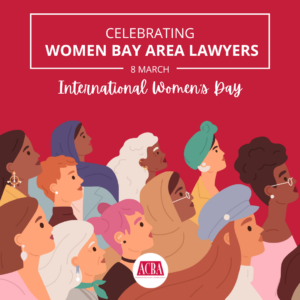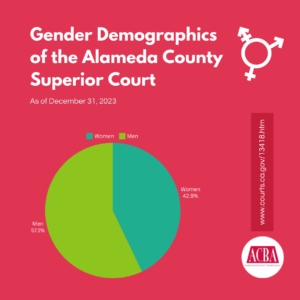International Women’s Day: Reflecting on Progress and Pursuing Equality in the Legal Field
Women have left an indelible mark on the legal profession, shaping the trajectory of justice and advocating for societal progress. From breaking barriers to leading groundbreaking cases, women lawyers have exhibited unparalleled resilience, dedication, and brilliance in pursuing equality and fairness under the law. As we commemorate Women’s History Month, it is crucial to celebrate and recognize their remarkable achievements as a testament to their perseverance and as a beacon of inspiration for aspiring women lawyers.
International Women’s Day (March 8, 2024) serves as a poignant reminder to honor and celebrate the achievements and contributions of women across all sectors of society. In the legal profession, women have made significant strides in recent decades, breaking barriers and reshaping the landscape of jurisprudence. As we commemorate this day, it’s crucial to reflect on the progress made and recognize the challenges that still lie ahead.
Gender Diversity in the Legal Profession: According to the 2022 Diversity Report released by the State Bar of California, women continue to represent a growing portion of the legal profession. As of the report, 40.9% of all California licensed attorneys identify as women, showcasing a steady increase in representation compared to previous years. This upward trend underscores the ongoing efforts to achieve gender parity within the legal field.
Moreover, the 2024 Judicial Diversity Report provides insights into the representation of women on the bench. While progress has been made, the report highlights the need for continued efforts to increase gender diversity among judges. As of the latest data, 37% of all judges in California identify as women, reflecting a positive trend but also revealing areas for improvement. We’re doing a little better in Alameda County, with women representing 42.9% of judges. Regrettably, this data does not include gender identities beyond the male/female binary.
Challenges and Opportunities: Despite the advancements in gender diversity, we all know that women in the legal profession still encounter various challenges. There remains systemic gender bias, unequal opportunities for advancement, and work-life balance issues, whether they are women in heterosexual relationships facing inequality in the home or they are women facing the many barriers and challenges LGBTQ families encounter. There is also the additional issue of bias and unequal opportunity for non-cisgender women whose identities as women are far too often openly questioned or challenged. All these issues hinder the full realization of gender equality within the legal profession.
As mentioned, intersectional challenges faced by women belonging to marginalized communities, including women of color, LGBTQ+ women, and women with disabilities, underscore the importance of addressing systemic inequities and fostering inclusivity at all levels of the legal profession. Intersectionality was coined in 1989 by professor Kimberlé Crenshaw and she uses the term to describe how race, class, gender, and other individual characteristics “intersect” and overlap.
As women in the profession strive to continue the progress and build upon gains made, consider that as you hear and learn about others’ lived experiences, it is crucial to recognize that experiences of discrimination can vary greatly, especially when marginalized identities intersect in one individual. It is crucial to listen when someone shares their experiences of discrimination. Moreso, it is crucial to pursue knowledge and understanding for anything you hear that is unfamiliar or novel, rather than rejecting or questioning the validity of someone’s experiences.
Celebrating Women’s Achievements: On International Women’s Day, it’s essential to celebrate the achievements and contributions of women lawyers who have blazed trails and shattered glass ceilings. From pioneering legal scholars and trailblazing judges to advocates for social justice and champions of equality, women have played instrumental roles in shaping legal history.

Throughout history, women have confronted systemic barriers and discrimination in their journey for representation and acknowledgment within the legal arena. One such trailblazer was Clara Shortridge Foltz, California’s first woman lawyer. A mother of five small children abandoned by her husband, Foltz turned to the law to support her family, studying in the office of a local judge. Instead of directly challenging California’s law limiting bar admission to “white male citizens,” Foltz pursued a different approach. She paved the way for her legal career by successfully advocating for the passage of the Woman Lawyer’s Bill, which allowed admission to “any citizen or person.” This landmark legislation, one of the earliest in America, opened the doors for women to practice law. In the same year, Foltz passed the California bar exam, marking her historic milestone as the first woman lawyer on the US West Coast.
Call to Action: On International Women’s Day and beyond, let us reaffirm our commitment to advancing gender diversity and inclusion within the legal profession. By fostering an environment that values diversity, equity, and belonging, we can create opportunities for all legal professionals to thrive and contribute meaningfully to the pursuit of justice.
One of the most impactful ways to honor the legacy of women in law is to inspire and empower future generations of women to pursue careers in the legal profession. By nurturing talent, fostering mentorship, and providing opportunities for professional development, we can cultivate a diverse pipeline of women lawyers ready to tackle the complex challenges of the 21st-century legal landscape. If you would like to sign up to mentor a newer attorney as a part of the ACBA Barristers Mentorship Program, please get in touch with salma@acbanet.org.
Together, let us work towards a future where women lawyers are empowered to excel, lead, and make a lasting impact on the legal profession and society.


